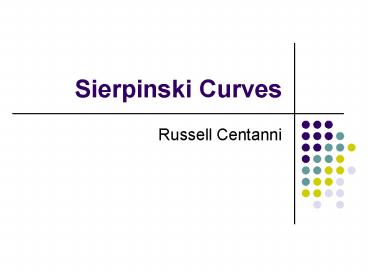Sierpinski Curves PowerPoint PPT Presentation
1 / 24
Title: Sierpinski Curves
1
Sierpinski Curves
- Russell Centanni
2
Overview
- Waclaw Sierpinski
- Sierpinski Curves
- Generating a Sierpinski Curve
- Other Fractals from Sierpinski
- Uses of Sierpinski Fractals
- Summary
3
Waclaw Sierpinski
- Born 14, March 1882 Warsaw, Russian Empire.
- Russians forced the Poles to learn the Russian
language and to adopt the Russian culture. - Resulted in extremely high illiteracy and a drop
in the number of students.
4
Sierpinski the Student
- 1899 Entered the Department of Mathematics and
Physics at the Czars University (University of
Warsaw). - Staff was entirely Russian.
- 1903 Sierpinski received a gold medal for the
best essay on Voronoys contribution to number
theory. - His essay was not published until 1907, due to
strikes against Russian schools and because I
did not want to have my first work printed in the
Russian language. - we had to attend a yearly lecture on the Russian
language. ... Each of the students made it a
point of honour to have the worst results in that
subject. ... I did not answer a single question
... - Almost resulted in Sierpinski receiving a lesser
degree.
5
Career
- 1920 Sierpinski studied the Sierpinski Curve.
- 1921 He became Dean of faculty at the University
of Warsaw. - 1928 Vice Chairman of the Warsaw Scientific
Society and chairman of the Polish Mathematical
Society.
6
WWII
- Was able to make publications by sending them to
Italy. - House was burned after an uprising against the
Nazis in 1944. - In a lecture at Jagiellonian University in
Krakóv, he mourned the loss of more than half of
all Polish mathematicians.
7
Contributions and Death
- Made his greatest contributions in set
theory(axiom of choice and to the continuum
hypothesis), point set topology and number
theory. - Died 21 October, 1969.
- During his life he authored 724 papers and 50
books.
8
Sierpinski Curves
- Closed Path containing every interior point of a
square. - Fills two dimensional space. AKA space-filling
curve. - It is the limiting curve of an infinite sequence
of curves numbered by an index of n 1,2,3 - By scaling the curve down ½ at each n, it comes
closer and closer to every point in the region. - The length of the curve is infinity (hence a
fractal) - Area enclosed is 5/12 that of the square
9
What does it look like?
10
Sierpinski Curve
11
Sierpinski Arrowhead
12
Generating Sierpinski Curves
- Sierpinski Curves can be generated through a
recursive algorithm. - ZIG
- ZAG
- Base case of n 1
- Can also be unrolled into string of a Sierpinski
Curve Grammar - Grammar generation may still be done recursively.
13
Recursive Algorithm
- ZIG(n)
- if n 1 then
- turn left
- advance 1
- turn left
- advance 1
- else
- ZIG(n/2)
- ZAG(n/2)
- ZIG(n/2)
- ZAG(n/2)
- ZAG(n)
- if n 1 then
- turn right
- advance 1
- turn right
- advance 1
- turn left
- advance 1
- else
- ZAG(n/2)
- ZAG(n/2)
- ZIG(n/2)
- ZAG(n/2)
14
Recursive Algorithm
- MAIN
- ZIG(2)
- ZIG(2)
15
Example
CALLS ZIG(2) ZIG(1) turn left advance 1 turn
left advance 1
ZIG(n) if n 1 then turn left advance 1 turn
left advance 1 else ZIG(n/2) ZAG(n/2) ZIG(n/
2) ZAG(n/2)
16
Example
CALLS ZAG(1) turn right advance 1 turn
right advance 1 turn left advance 1
ZAG(n) if n 1 then turn right advance
1 turn right advance 1 turn left advance
1 else ZAG(n/2) ZAG(n/2) ZIG(n/2) ZAG(n/2)
ZIG(n) if n 1 then turn left advance 1 turn
left advance 1 else ZIG(n/2) ZAG(n/2) ZIG(n/
2) ZAG(n/2)
17
Example
CALLS ZIG(1) turn left advance 1 turn
left advance 1
ZIG(n) if n 1 then turn left advance 1 turn
left advance 1 else ZIG(n/2) ZAG(n/2) ZIG(n/
2) ZAG(n/2)
18
Example
CALLS ZAG(1) turn right advance 1 turn
right advance 1 turn left advance 1
ZAG(n) if n 1 then turn right advance
1 turn right advance 1 turn left advance
1 else ZAG(n/2) ZAG(n/2) ZIG(n/2) ZAG(n/2)
ZIG(n) if n 1 then turn left advance 1 turn
left advance 1 else ZIG(n/2) ZAG(n/2) ZIG(n/
2) ZAG(n/2)
The next call is ZIG(2), which will complete the
Sierpinski Curve (n2).
19
Grammar Algorithm
- aa
- a ? abab
- b ? bbab
n 1 aa n 2 abababab n 3
ababbbabababbbabababbbabababbbab n 4
ababbbabababbbabbbabbbabababbb
20
Grammar Algorithm
- Generated strings can then be iterated over
- a ? ZIG
- b ? ZAG
- Recursion is unrolled into the Sierpinski Curve
String.
21
Other Fractals associated with Sierpinski
- Sierpinski Triangle
- Sierpinski Carpet
22
Sierpinski Fractal Uses
- Antenna Research.
- Work equally well at all requencies.
- Higher frequencies, they are naturally broadband.
- Multiband performance.
- Good performance at smaller sizes.
- Simplifies circuit design.
23
Summary
- Sierpinski curves are space-filling curves.
- Easily generated using recursion.
- Also easily implemented using a grammar.
- Sierpinski triangle researched for use as an
antenna design.
24
References
- Dewdney, A. K. The New Turing Omnibus. Computer
Science Press/Freeman, New York, 1993. - McLauchlan and C. Phillips. Sixth Form
Conference - Sierpinski Curve. Taster Conference
2001 Practical Session P6. Interactive Java
Programming December 12, 1995. March 20, 2005. - OConnor, J.J. and E F Robertson. Waclaw
Sierpinski. The MacTutor History of Mathematics
archive. March 21, 2005. - Eric W. Weisstein. "Sierpinski Arrowhead Curve."
From MathWorld--A Wolfram Web Resource.
http//mathworld.wolfram.com/SierpinskiArrowheadCu
rve.html - Eric W. Weisstein. "Sierpinski Curve." From
MathWorld--A Wolfram Web Resource.
http//mathworld.wolfram.com/SierpinskiCurve.html

